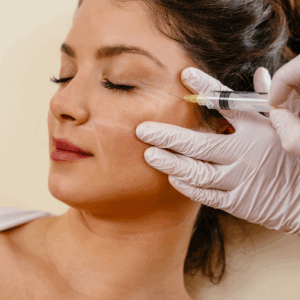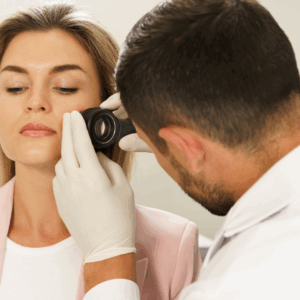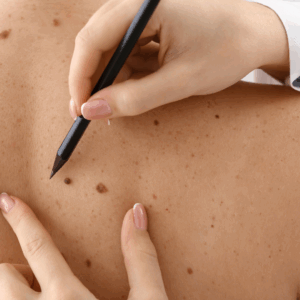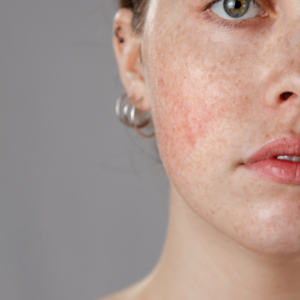
Sweat, Sunscreen, and Acne: How to Stay Clear Through Spring Activities
Think skin exams are only for those with visible concerns? Annual skin checks can detect early signs of cancer.
Did you know that skin cancer is the most common type of cancer in the world? According to the World Health Organization (WHO), an estimated 1 in 3 cancers diagnosed worldwide is skin cancer. In the United States alone, more than 5 million cases of skin cancer are diagnosed each year, making it the most common type of cancer in the country.
What’s even more concerning is that many people may have skin cancer without even knowing it. In fact, the Skin Cancer Foundation reports that about 1 in 5 Americans will develop skin cancer by the age of 70, and more than 90% of all skin cancers are caused by sun exposure.
Although the statistics about skin cancer may appear disconcerting, the positive aspect is that skin cancer can be effectively treated, particularly if it is identified in its early stages. This article will focus on the different types of skin cancers and their causes and outline ways to prevent and treat them.
While this article spells out some important information about skin cancer, we highly recommend you read the full article, here are the key points we will focus on:

Skin cancer is a type of cancer that affects the skin’s cells. Anyone can develop skin cancer, but some people are at higher risk than others. Due to lower levels of skin pigmentation, Caucasian populations are more at risk of getting skin cancer than individuals with naturally darker complexions. According to WHO, individuals with fair or freckled skin, light-coloured or red hair, and blue eyes are at the highest risk, while those with dark hair and eyes who do not normally experience sunburn are at medium risk. However, excessive exposure to intense sunlight, and a history of sunburn can damage all skin types. Additionally, people with a weakened immune system, a family history of skin cancer, and those who have been exposed to radiation or certain chemicals are also at increased risk.
The primary cause of skin cancer is exposure to ultraviolet (UV) radiation from the sun or tanning beds. UV radiation exposure can damage the DNA of skin cells, causing the cells to grow out of control and form a cancerous tumor. This can happen even after just a few instances of exposure to UV radiation, and the damage is cumulative over time. Therefore, protecting your skin from UV radiation is crucial in preventing skin cancer.
There are three main types of skin cancer: Basal cell carcinoma, Squamous cell carcinoma, and Melanoma. Basal and Squamous cell carcinomas are the most common forms of skin cancer, while Melanoma is the most life-threatening.
Melanoma occurs when the pigment-producing cells in the skin, called melanocytes, grow uncontrollably and form a tumor. It can appear anywhere on the skin but is most commonly found on the back, legs, arms, and face. Risk factors for Melanoma include having fair skin, a history of sunburns, a family history of the disease, and a weakened immune system.
Basal cell carcinoma (BCC) accounts for about 80% of all skin cancer cases. It typically appears on sun-exposed areas of the skin, such as the face and neck. BCC usually grows slowly and rarely spreads to other body parts, but if left untreated, it can invade nearby tissue and cause disfigurement. Risk factors for BCC include prolonged sun exposure, a history of indoor tanning, and having fair skin.
Squamous cell carcinoma (SCC) is the second most common form of skin cancer. It arises from the squamous cells in the outer layer of the skin and can appear on any part of the body, although it is most commonly found on sun-exposed areas like the face, ears, and hands. SCC can grow quickly and invade nearby tissue; in rare cases, it can spread to other body parts. Risk factors for SCC include sun exposure, a history of indoor tanning, and having fair skin. People who have had organ transplants and are taking immunosuppressive drugs are also at increased risk for SCC.
Several warning signs can indicate the presence of skin cancer. Here are some things you should be on the lookout for:
Preventing skin cancer is possible by taking simple steps to protect your skin from harmful UV rays. Here are some things you can do to reduce your risk of developing Skin Cancer:
Following these simple steps can significantly reduce your risk of developing skin cancer and help you enjoy the sun safely.
When it comes to treating skin cancer, various options are available depending on the type, size, and location of the cancer. One of the most common treatments is surgical removal, which involves cutting out the cancerous tissue and some surrounding healthy tissue. Other options include cryotherapy, radiation therapy, topical medications, and photodynamic therapy.
At Bryn Mawr Dermatology (BMD), our skilled dermatologists will do a Skin Cancer Screening in which our medical provider will thoroughly examine your skin to identify any suspicious spots. While we cannot observe internal or obscured structures, we advise that you ask your dentist, hairdresser, ophthalmologist, and gynecologist to check for any signs of skin cancer in their respective areas. It’s also important to perform monthly self-examinations since patients often identify concerning spots between screenings. To help with self-examinations, BMD offers a simple guide outlining the common signs of skin cancer.
Alastin HydraTint, Elta MD, Isdin, and Heliocare products are just some of the excellent products Bryn Mawr Dermatology recommends to their patients. Many of these products can be tailored to your specific skin prevention or skin repair needs. We understand how busy life can get but also the importance of including sunscreen in your daily skin care routine, so Bryn Mawr Dermatology offers the ease and convenience of purchasing these items online or in our offices. You can purchase them 24/7 at Bryn Mawr Dermatology or walk in during normal practice hours.
At Bryn Mawr Dermatology, our knowledgeable dermatologists will conduct a comprehensive skin cancer screening and discuss various options for removing cancerous lesions, as well as develop a tailored treatment plan based on your individual case.
Our office is well-equipped to address your skin cancer concerns, and our compassionate staff will make you feel welcomed and at ease from the moment you arrive. If you’re interested in receiving our services, please contact our dermatology team at 610-410-9219. We are excited to provide you with quality care!

Think skin exams are only for those with visible concerns? Annual skin checks can detect early signs of cancer.

Think skin exams are only for those with visible concerns? Annual skin checks can detect early signs of cancer.

Think skin exams are only for those with visible concerns? Annual skin checks can detect early signs of cancer.

Think skin exams are only for those with visible concerns? Annual skin checks can detect early signs of cancer.

Discover a youthful lift without surgery. Learn how our thread lift at Bryn Mawr Dermatology can rejuvenate your appearance.

Discover a youthful lift without surgery. Learn how our thread lift at Bryn Mawr Dermatology can rejuvenate your appearance.

By: Bryn Mawr Dermatology, Published: May 1, 2023
Medically Reviewed By: Christine Stanko, MD, FAAD – June 25, 2024
For COSMETIC APPOINTMENTS:
For MEDICAL APPOINTMENTS: